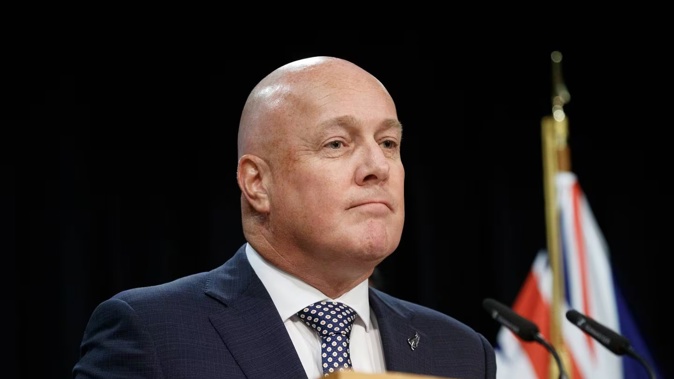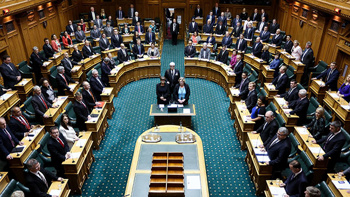
New Zealanders have a fresh update on the state of the nation after newly released briefings to the incoming Government’s ministers revealed the challenges facing the coalition.
The briefings, given to ministers late last year and published today, included warnings of the impact of the Government’s significant health reforms, concerns over inequitable outcomes in the education system, an increase in people taking up the main benefit, recruitment concerns for police and even an evaluation of the risk of a major earthquake that would leave tens of thousands dead, injured or displaced.
It set the scene for another day of scrutiny on Police Minister Mark Mitchell and Associate Health Minister Casey Costello as the Opposition looked to heap pressure on the pair, while the Government also announced a 2 per cent rise in the minimum wage to $23.15 per hour from April 1.
One of the more alarming pieces of information was housed in the National Emergency Management Agency briefing to Mitchell, also the Emergency Management Minister.
It said recent research found a 25 per cent “probability of a major Hikurangi Subduction Zone ... earthquake event occurring in the next 50 years”.
Officials warned “indicative national impacts of a major Hikurangi earthquake and tsunami include tens of thousands of people dead, injured or displaced from their homes, and significant damage to the built environment (in excess of $144 billion)”.
The paper said a quake and tsunami caused by the Hikurangi subduction zone could happen “tomorrow”.
”If not in our lifetime, then in that of the next generation. Crucially, it could happen tomorrow.”
Mitchell was also briefed on the recruitment challenges within the police, something which could jeopardise the Government’s aim to train 500 new police in two years.
Police officials believed any desired workforce growth couldn’t be achieved through current recruitment levels given the likelihood of attrition - officers leaving the workforce - to increase with the “large number” of staff being older than 55 years.
- MSD warns incoming minister of rising number of Kiwis on benefit, more increases likely
- Watch live: 'No undue influence'- Seymour hits back at claims about tobacco industry
- The ideal outcomes from foreign and defence meeting between New Zealand and Australia
- Live: Minister briefings - Concerns over gangs, high migration, mental health trauma after Covid
A letter from Police Commissioner Andrew Coster was included in the briefing, which accepted more needed to be done to curb “blatant offending” - a nod to Mitchell’s letter of expectations he sent to Coster last year.
Mitchell, also Corrections Minister, was informed of an increasing prison population, a key part of National’s election campaign last year.
/cloudfront-ap-southeast-2.images.arcpublishing.com/nzme/B4WDXDFHYNBNLNOQESVYDRX6M4.jpg)
Minister Mark Mitchell has faced pressure for his comments regarding the Government's police staff boost commitment. Photo / Mark Mitchell
But he was also told of the increase in the number of people on remand - those in prison awaiting trial or sentence - and how that was creating challenges for the department.
Also problematic was an increase in the number of inmates with extremist views.
“In recent years, there has been an increase in the number of people we manage who are identified as potentially holding extremist views or displaying risk factors and indicators specific to radicalisation or violent extremism.”
A rise of violent extremism aligned with global trends, something which had been an issue referenced in the past by the Ministry of Foreign Affairs and Trade.
The briefing for Foreign Affairs Minister Winston Peters painted a depressing, if not scary, picture of the world, saying it has become “less prosperous, less secure and less free” since Covid-19 came along.
”New Zealand can no longer rely on the durability of continuing international co-operation and trade liberalisation, which have been the foundation of its foreign, trade and economic policies for decades.”
It added to the briefing to Judith Collins from the NZ Security Intelligence Service and the Government Communications Security Bureau, which said foreign states attempting to drive “social change” had become an increasing feature of the threats facing New Zealand.
Officials said strategic level competition among big powers “to advance competing visions” of the regional and global orders had again come to the fore. In doing so, it has made “the global and regional security environment more complex and unpredictable”.
/cloudfront-ap-southeast-2.images.arcpublishing.com/nzme/Z55N4PI4T5AULKBRPWEKUZDNCQ.jpg)
Foreign Affairs Minister Winston Peters and Defence Minister Judith Collins during a post-Cabinet press conference. Photo / Mark Mitchell
That instability for a “small export nation which relies on stable international rules-based order” posed a greater threat to nations like New Zealand than it might to larger countries, Collins was told.
In health, Minister Shane Reti’s briefing said the health system overall served New Zealanders well but had much work to do, including responding to workforce shortages, the ongoing impact of the Covid-19 pandemic and ageing populations - while also implementing major reforms.
Those reforms were referenced in a warning of “change fatigue” as the Government prepared to scrap the Māori Health Authority - an election promise.
“There is significant organisational change fatigue in the health system,” the briefing said.
“The next couple of years will be important for stabilising, consolidating, and refining the new operating roles and functions of key entities, including the changes resulting from the disestablishment of the MHA.”
The education briefing to minister Erica Stanford pointed to issues with delivering equitable outcomes with long-standing challenges to “deliver education success for Māori, Pacific peoples, deaf people and those with disabilities and those from low socio-economic backgrounds”.
It also noted the fact our education system was devolved - meaning each school or education provider was able to make significant decisions.
”The downside is that, without some central support for and accountability in areas where it matters (eg the quality of teaching and learning, the strength of connections to family and whānau), this can lead to high levels of variability of teaching practice and outcomes for learners and inefficiencies in resource use (eg good teaching practice being built multiple times in multiple classrooms but not adopted more broadly.”
The number of people on the main benefits was on the rise, according to the Ministry of Social Development, increasing to 11.3 per cent. This was up 0.2 per cent from September 2022.
/cloudfront-ap-southeast-2.images.arcpublishing.com/nzme/3SZDEUJQKFF2FDIARDJUPLAFJQ.jpg)
Social Development Minister Louise Upston was told of the increasing number of people on the main benefits. Photo / Michael Craig
It also warned minister Louise Upston that unemployment figures and demand for housing assistance would likely grow as the rising cost of living hits Kiwi households.
The Government’s wishes to reduce spending in the public service prompted feedback from the Public Service Commission that caps on staff numbers or a hiring freeze were “blunt instruments and could lead to increased pressure on contractor and consultant spend - something National railed against during the Labour Government.
After the release of the briefings, Workplace Relations and Safety Minister Brooke van Velden announced the increase to the minimum wage. Because the cost of living was expected to increase by more than 2 per cent over the next year, those on the minimum wage would likely go backwards financially.
She argued it was a “cautious approach” informed by the “headwinds” facing the economy.
The action moved to the House where minister Casey Costello continued to deny she had created a proposal to freeze increases in tobacco excise tax, claiming she had sent health officials previous party policies, which included the proposal.
Labour’s Dr Ayesha Verrall accused Costello of misleading the public by maintaining she hadn’t asked for advice on the proposal when leaked documents indicated she had. Verrall called on Prime Minister Christopher Luxon to strip Costello of her ministerial portfolios.
Meanwhile, Mitchell as Police Minister admitted the 500 new police officers in two years promised by the Government did not take into account the officers lost to attrition, something Police Association president Chris Cahill had hoped was the case when speaking to media this morning.
In the House, he did commit that recruitment standards would not be lowered to achieve the target.
Adam Pearse is a political reporter in the NZ Herald Press Gallery team, based at Parliament. He has worked for NZME since 2018, covering sport and health for the Northern Advocate in Whangārei before moving to the Herald in Auckland, covering Covid-19 and crime.
Take your Radio, Podcasts and Music with you









